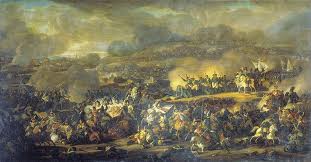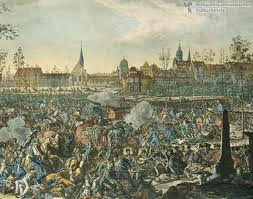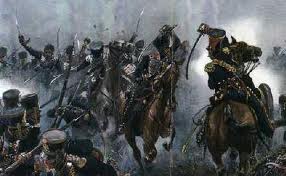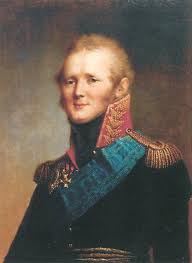 At the moment, I’m deeply immersed in reading eye-witness accounts of the Napoleonic campaigns, from the spring of 1813 through the autumn of that year, culminating in the battle to end all battles, the Battle of Leipzig. Fought over three days in October, from the 16th to the 19th, and also known as the Battle of the Nations. And it was fought, basically, by everyone–Russians, Austrians, Prussians, Swedes–against Napoleon and his Grande Armee.
At the moment, I’m deeply immersed in reading eye-witness accounts of the Napoleonic campaigns, from the spring of 1813 through the autumn of that year, culminating in the battle to end all battles, the Battle of Leipzig. Fought over three days in October, from the 16th to the 19th, and also known as the Battle of the Nations. And it was fought, basically, by everyone–Russians, Austrians, Prussians, Swedes–against Napoleon and his Grande Armee.
And what these survivors are telling me is so much more poignant and truly horrifying than anything I could have imagined. Nor is there any of the propaganda that has over the past two centuries skewed our vision of what they experienced in this War to end all wars.
This is from Louis von Kaisenberg, who wrote to his father from Kassel on 18 February 1813, about the return of the survivors of the Russian invasion and about the terrible cost of Napoleon’s wars:
When I recall the day on which we saw the troops march away from here in the glittering uniforms and all the freshness of youth, each man filled with hopes of winning fame and honour, and now! We stared at the poor wretches, their heads and feet wrapped in tatters, the upper part of the body covered with rags of every possible material or else with straw matting. Even hides, still full of dried blood, covered their nakedness.
The expression in the pallid features was a terrible one, their eyes stared from their white, lined faces as if they could still see all the horrors which had lain in wait for them on the icy steppes of Russia; and their words sounded hollow and rough, as though cries of pain had made them hoarse.
Most of the poor devils could hardly drag themselves forward, so great was their exhaustion and sickness. Their faces, blackened from the smoke of camp-fires, covered with weeks-old dirt from the roads, eaten away by every conceivable disease like gangrene, and gnawed by vermin, stared out of their rags with a ghostly expression…
Is it possible, dear father, that one human being can have such power in the world that he can bring all this hundred thousand-fold misfortune upon his fellow beings? Will Almighty God not step in to remove this one man from the position in which he sits omnipotent?
But the remnants of the French Grande Armee were only the latest casualties of Napoleonic meglomania, for over the next several months, others were to write of what they were experiencing.
(I have long wondered–though few historians ever talk about them–what of the civilian populations at this period? Well, now I know the answers…)
General Antoine-Baudouin-Gisbert van Dedam van der Gelder, commanding a brigade under Napoleon wrote:
 The French were to complain loudly when their allies deserted them during the famous days of Leipzig, but I venture to ask them whether they would tolerate humiliations and bad treatment from allies more powerful than themselves, and whether they would not turn against men who devastated their country, burning and plundering everything, beating and raping without redress being made and oblivious to every complaint. Well! That is what the Saxons and other Germans have been suffering for years…
The French were to complain loudly when their allies deserted them during the famous days of Leipzig, but I venture to ask them whether they would tolerate humiliations and bad treatment from allies more powerful than themselves, and whether they would not turn against men who devastated their country, burning and plundering everything, beating and raping without redress being made and oblivious to every complaint. Well! That is what the Saxons and other Germans have been suffering for years…
Indeed! There were even songs making the rounds in 1806, following the Battle of Jena. The Prussian song went like this:
Durchmarschieren,
Einquartieren,
Alimentieren,
Requirieren,
Einskribieren,
Frau entfuhren,
Haus verlieren,
Nicht rasonnieren,
Und doch illuminieren:
Das ist doch zum krepieren.
(Marching troops, billeting, feeding, requisitioning, registration, wives abducted, householders evicted, and no argument allowed.)
While the opposite side of the coin, as sung by the French troops during the plunder of Weimar:
Buvons,
Brulons,
Fo*t*ns!
Mettons le feu a toutes maisons!
Venons a cinquante, cinq cent!
Chiens, brigands, paysans,
Ouvrez donc la porte! Panc!
(Let’s drink, let’s burn, let’s rape! Put to the torch all houses…Well, you get the gist…)
 And this was what was still going on, even on the morning of 16 October, the first day of fighting in the Battle of Leipzig, as observed by a librarian in the town, Karl Egon Ebert:
And this was what was still going on, even on the morning of 16 October, the first day of fighting in the Battle of Leipzig, as observed by a librarian in the town, Karl Egon Ebert:
That the immense crowd of people gathered in Leipzig could not fail to cause disorder and damage was to be foreseen; but that such devastation should occur could only have been imagined by someone who had already abandoned all faith in humanity.
As the Army’s magazines were soon emptied, and no fresh supplies could be hoped for; and as storms howled dreadfully during these awful autumn days a great deal had to be excused on grounds of urgent need, whenever a soldier who had hardened his heart against all gentler feelings took food where he could find any and dragged away anything that could be used for burning so as to warm himself by the flames or to provide some sort of shelter against the violent weather.
But when houses were deliberately pulled down, gardens maliciously destroyed, magnificent orchards either cut down or damaged quite needlessly, the villagers’ few remaining belongings stolen and destroyed by the French soldiers, and, finally, when during the early days such food as was found was ruined with devilish spite in the most wicked and shocking way–then even the most fanatical supporters of the French could say nothing except ‘That’s war!’
 And what was Napoleon himself doing at this time?
And what was Napoleon himself doing at this time?
A medium-sized table from a farm-house was placed on the stubble field [on the Galgenberg–Gallows Hill] with a chair behind it. Near by a huge watch-fire was blazing. A map of the district had been nailed to the table because the weather was rough and stormy. Most of the time Napoleon held, but seldom used, a small telescope–his sole instrument…
When Napoleon rode off to the battle, he looked sombre, withdrawn and somewhat rigid; but as soon as the first thunder of cannon sounded his taciturn face lit up. He became talkative and animated, though his expression remained domineering and solemn, but not sullen…
On his walks he occasionally fell in with parties of wounded men, some of them in a pitiable condition. As they were brought past him, he did not spare them a glance or move towards them: the whole matter left him quite indifferent.
The statistics from this three-day battle make the situation even clearer. Napoleon’s forces numbered 203,133 men and 738 guns. The Allied forces were composed of 361,942 troops and 1,456 guns.
 When the battle concluded and Napoleon and his French troops retreated in great disorder from the scene on the night of 18 October and well into the next day, 397 of his officers had been killed and 2,546 had been wounded.
When the battle concluded and Napoleon and his French troops retreated in great disorder from the scene on the night of 18 October and well into the next day, 397 of his officers had been killed and 2,546 had been wounded.
Among the other ranks, at least 43,500 had been killed or wounded; 8000 wounded were captured on the battlefields, and an additional 15,000 sick and wounded were taken captive from the Leipzig hospitals. Another 15,000 unwounded officers and men were captured. And 5,400 Saxons went over to the enemy.
However, over the next days, it became apparent that Napoleon had lost even more men through desertion–for of his 175,000-strong Grande Armee, he crossed the River Saale with fewer than 80,000 men.
The Allies fared far better, losing 1,792 officers and 51,982 men from a total of 361,942 men and 1,456 guns.
(I know–that’s lots of numbers. But at least one can gain a sense of the scale of this horrific battle from them…)
And it’s the combination of eye-watering statistics and painful first-hand accounts which are requiring the greatest philosophical digestion. And this is due to a few things Shakespeare wrote–as highlighted recently by the historian, Simon Schama, when discussing how 400 years ago, Shakespeare (in an age of absolute monarchy!) was daring to address the issues of kingship, the burden of it, the responsibilities of it, the successes or failures of the man wearing a crown. And it’s this that I’m most deeply pondering.
For Shakespeare’s great military hero-monarch is Henry V. And this is what he says on the eve of battle:
“Upon the King! Let us our lives, our souls,
Our debts, our careful wives,
Our children, and our sins, lay on the King!”
We must bear all. O hard condition,
Twin-born with greatness, subject to the breath
Of every fool, whose sense no more can feel
But his own wringing! What infinite heart’s-ease
Must kings neglect that private men enjoy!
And what have kings that privates have not too,
Save ceremony, save general ceremony?
And what are thou, thou idol Ceremony?
What kind of god art thou, that suffer’st more
Of mortal griefs than do thy worshippers?
What are thy rents? What are thy comings-in?
O Ceremony, show me but thy worth!
 Here though is a bit of the letter, written by the Commander-in-Chief of the Allied Army, General Schwarzenberg, to his wife, on the evening of the Battle of Leipzig.
Here though is a bit of the letter, written by the Commander-in-Chief of the Allied Army, General Schwarzenberg, to his wife, on the evening of the Battle of Leipzig.
When I look out of my window and see the countless watch-fires outstretched before me, and when I consider that I face the greatest military commander of our age, and one of the greatest of all time, a veritable emperor or battles, then, my dear Nani, I must admit that I feel my shoulders are too weak and will collapse under the gigantic task which weighs upon them.
But when I gaze up at the stars, I recall that He who controls them has also marked out my course. If it is His will that right shall prevail, and I hold our cause to be just that, then His wisdom will enlighten me and give me strength…
If all goes well, then I shall enjoy my life with you and the children, and we shall once again plant and tend our trees.
One war. A myriad of different emotions and stories–so many of them dreadful beyond telling. Yet Shakespeare managed, didn’t he? He never shied from the truth, did Shakespeare? Not even about war. He didn’t prettify or softenthe edges–even though his audience included kings and queens who might not love his blistering honesty.
Yet, without hesitation, he delved into the darkest recesses of burdened souls and secretly breaking hearts, and always turned these explorations into a paradigm of literary and historical beauty–even a most terrible beauty that sears our minds even as we revel in its perfection.
A thing to aim for surely. And perhaps, this is my answer to a question that’s been kicked about recently on various fora–which writers influence you? To whom do you return again and again to learn how to write?
 A break-through occurred on a day-trip with my rather ingenious and maths-minded daughter a bit ago, when I put forward my difficulty with all the research (no, I am not going to tell you how many tomes or how many languages…) and asked if she could see her way to organising it all for me. She, being very whizzy at these sorts of problems, had three different solutions in about 30 seconds. All of which were excellent. (I hate that. It’s so breathtakingly easy and she makes it all seem so obvious…)
A break-through occurred on a day-trip with my rather ingenious and maths-minded daughter a bit ago, when I put forward my difficulty with all the research (no, I am not going to tell you how many tomes or how many languages…) and asked if she could see her way to organising it all for me. She, being very whizzy at these sorts of problems, had three different solutions in about 30 seconds. All of which were excellent. (I hate that. It’s so breathtakingly easy and she makes it all seem so obvious…) A new opening chapter has presented itself which makes brilliant sense of all sorts of things and which just popped out of the too many notebooks of research notes and I find myself in the unusual position of being quite positive, hopeful and even feeling a bit of the old Bennetts wit returning to the page…
A new opening chapter has presented itself which makes brilliant sense of all sorts of things and which just popped out of the too many notebooks of research notes and I find myself in the unusual position of being quite positive, hopeful and even feeling a bit of the old Bennetts wit returning to the page…



























